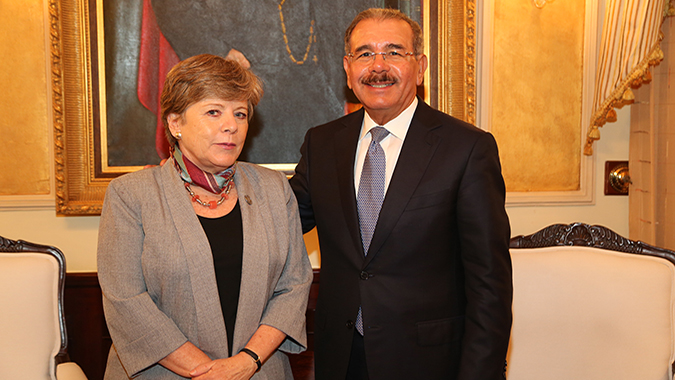ECLAC’S Executive Secretary Reiterates the Organization’s Technical Support to the Work of CELAC
Work area(s)
At a meeting of Foreign Affairs Ministers, Alicia Bárcena presented an economic and social overview of the region and its prospects in light of the 2030 Agenda. She emphasized the need to give the economy a big environmental push with new technology and investment paradigms, within a horizon of equality and sustainability.

“In Latin America and the Caribbean we need a big environmental push for the equality and sustainability of development in the framework of the 2030 Agenda, to face a complex global context,” Alicia Bárcena, ECLAC’s Executive Secretary, said during a high-level meeting in the Dominican Republic.
The most senior authority of the Economic Commission for Latin America and the Caribbean (ECLAC) was one of the main speakers at the X Meeting of Ministers of Foreign Affairs of the Community of Latin American States (CELAC), held today in Santo Domingo, where she reiterated ECLAC’s full disposition to continue giving technical support to CELAC’s work consistently throughout this year.
The event was inaugurated by Andrés Navarro García, the Minister of Foreign Affairs of the Dominican Republic, which currently holds the bloc’s Pro Tempore Presidency. The meeting was attended by Foreign Affairs Ministers and CELAC’s National Coordinators from 30 of the region’s countries, who gathered to analyze the future of the group and its relationships with other regional integration organizations. Participants also debated political matters of regional interest, such as the relationship with the European Union, Russia, India, Turkey, Japan and other Asian countries, and ties with multilateral institutions.
As a special guest, Alicia Bárcena made a presentation before the authorities on the economic and social situation of Latin America and the Caribbean and its prospects, in light of the 2030 Agenda for Sustainable Development, approved last September by the United Nations’ member states.
Bárcena also paid homage to Magali Pineda, architect of the Dominican Republic’s feminist movement, a sociologist, professor and researcher, who died last Tuesday, March 29. “She leaves a huge legacy; her contribution to equality, sexual and reproductive rights, the rights over one’s own body, the elimination of violence, women’s access to politics, to promoting and guaranteeing the access of girls and women to information and communication technologies, and to closing the digital gender gap,” she expressed.
In her speech, Bárcena recalled that the world economy faces a widespread deceleration process, with a decoupling between the financial sector and the real economy and a strong rise in inequality (for example, just 62 individuals have the equivalent wealth of 3.6 billion people). She said that our region has stalled in its economic and social progress and shows the worst export performance in decades, low productivity and competitiveness, high structural heterogeneity, poor innovation, insufficient fiscal space, and environmental vulnerability, among other shortcomings.
“That is why we should promote a progressive structural change that increases the incorporation of knowledge in production, guarantees social inclusion and combats the negative effects of climate change,” said the senior United Nations official.
Bárcena explained that this proposal by ECLAC—which aims to foster a new development pattern centered on the 2030 Agenda—will be presented by the organization to its member states at the Commission’s next session, to be held on May 23-27 in Mexico, and will be included in the document entitled Horizons 2030: Equality at the Center of Sustainable Development.
“The 2030 Agenda is a civilizing agenda that puts people at the center, takes care of the planet and of achieving shared prosperity. It is about a universal agenda that proposes that it is necessary to be equal to grow, and to grow to be equal, with quality of life going beyond minimum well-being. That’s the aim of the 17 Sustainable Development Goals (SDGs) and their 169 targets,” Bárcena said.
ECLAC’s Executive Secretary added that the 2030 Agenda seeks to reach economic, social and environmental inclusion by promoting a structural change with productive development, and universal access to social protection and public goods.
After CELAC’s meeting of Ministers of Foreign Affairs, Alicia Bárcena held a private meeting with the Dominican Republic’s President, Danilo Medina, to whom she reiterated ECLAC’s commitment to permanently support the bloc’s work. Both officials also discussed aspects of bilateral cooperation.
In addition, ECLAC’s Executive Secretary reiterated to President Medina the invitation to the Dominican Republic’s Minister of Foreign Affairs to participate in the Thirty-sixth session of the Commission. Finally, at the meeting they both shared their reflections on the document Horizons 2030, which will be unveiled on that occasion.
Related content
A complex international context and the 2030 Agenda The Latin American and Caribbean perspective
Presentation by Alicia Bárcena, ECLAC Executive Secretary, at the X Meeting of Ministers of Foreign Affairs of the Community of Latin American States (CELAC).
Country(ies)
- Dominican Republic